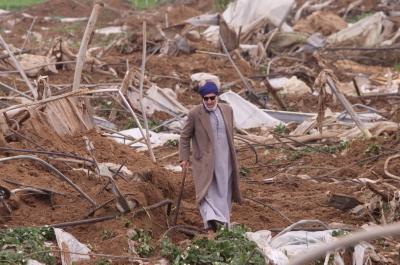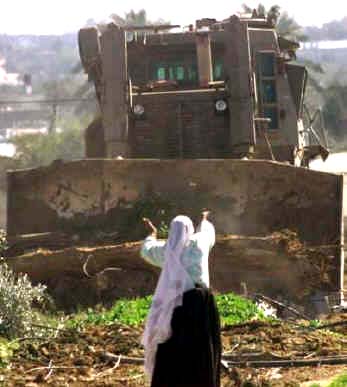One Palestinian's
Story: Grandfather's Olive Groves
Sleep in Peace,

Samah
One Palestinian's Story: Grandfather's Olive Groves
Washington Report on Middle East Affairs
Among the most joyous moments of my childhood were days spent picking olives. I'm a city person, born and raised in Jerusalem but, like every Palestinian, I have a connection with the village and the vineyard, with the farm, and the fruit groves.
My grandfather, Abu-Faheem, was born in 1915 in Kifel-Hares, a village suburb of Nablus. A Holy Land village is a cluster of stone houses nestled among fruit and olive groves. The homes, usually within sight of one another, are connected by a winding road and rocky outgrowths that our children scramble among in their play. There may be a local family-run convenience store, but mostly villages are simple rural neighborhoods where everyone knows everyone else. There is a coziness in the familiarity that makes our social and family lives complete -- that makes us Arab.
At the end of World War I, my grandfather needed work and, like many young men of that era, moved to Jerusalem to seek his fortune. He worked for a time with the British police and began to mix with Europeans and Jews, people of various cultures. All the while, though, he missed his family and friends in Kifel-Hares. So, not surprisingly, he used the money he made to invest in land in his village.
Juha's Olive Oil
It wasn't long before grandfather could afford to re-establish himself in Kifel-Hares. There, he planted olive trees, bought a used olive press, and put his old blind donkey, Juha, to work. Juha spent his days moving the press, going round and round enormous piles of fresh green olives. My grandfather praised Juha and credited him with the family's reputation for yielding the best olive oil in the region.
Really, though, it was my grandfather's ingenuity that made the family's olive oil special. He had learned something in the big city. He invested in huge storage jars and would leave the freshly made oil in the jars until it separated into two layers. Then he would skim off the top layer and sell this for cooking oil. The bottom layer he used to manufacture soap. Like a primitive chemist he'd work in a musty, old room where he would spend hours inventing and improving his soon-to-be famous soap. He was, in fact, an entrepreneur, although no one would have called him that at the time. I remember stepping into his old "research" lab after he died and it was closed down. The room still smelled of olive oil. I felt as if I had stepped back into the Middle Ages.
My grandfather passed away long before I was born, so I never knew him. But I saw the pride in my grandmother's face when she showed us children her and our inheritance: the olive groves, the olive press and grandfather's laboratory.
"We'll pick olives and it will be like it always has been."
My father and mother were not tied to the groves like my grandmother and some of my aunts and uncles. My parents chose academic work and city life. Today, it isn't even our family who cares for our groves, but close friends, whom we consider family, from the village. Yet despite the fact that my family did not remain in Kifel-Hares to take care of our property, my brother and sisters and I were brought up attached to the village. It was the melody stringing all the chords of our daily lives together.
For as long as I can remember, every year our whole family -- uncles, aunts, and cousins -- would go to Kifel-Hares to pick olives together. There our friends would laugh at us and say, "Look at the city folks. You are too soft to pick olives. May God bless the soul of Abu-Faheem. He was a real man!"
"What do you mean?" my brother would shout back. "Kifel-Hares is a museum. We've heard the story of the laboratory and the patient donkey, Juha, many times."
Even though we joked about it, the story had great significance. Always one of the older children would trot the youngest child around to see grandpa's old equipment. We'd end the day with a delicious meal of musakhan, chicken covered with the spice sumac and baked in a huge outdoor stone oven. Everyone in the village would celebrate the harvest with us.
In mid-October, despite our concerns about the violence surrounding us, we planned somehow to take my little nephews, ages 4 and 5, to Kifel-Hares to celebrate the season of picking olives."We need a day to forget this violence and all our troubles," I told my parents. "We'll go to Kifel-Hares and we'll pick olives and it will be like it always has been."
 Attacks on Farmers
Attacks on Farmers A few days before we were about to go, however, news reports announced that several settlements had sent their people to attack Palestinian farmers while they were picking their olives. My parents decided to delay the trip.
Perhaps we should have gone, regardless. For only a few days after we decided not to go to Kifel-Hares, the Israeli Authority, in conjunction with residents of the Ariel settlement, confiscated our 20,000-square meter-olive grove and bulldozed more than 400 olive trees, uprooting them and destroying my grandfather's legacy to us. Our family property is at the edge of the settlement, and the Israelis claimed they needed our land to provide more security for their settlers.
Israeli soldiers and settlers uprooted our "olive-pregnant" trees not only for security, we fear, but to expand settlements in spite of (or perhaps to take advantage of) the current tensions.
We did not cry when we heard the news of the death of our olive grove, for we are full of laments for the people we know who have died in this intifada. But our olive groves and our precious trees are hard to forget. The trees were our symbols of family love, solidarity, history, and peace.
Although the trees are gone, our memories, like those of any family anywhere, remain. They are no longer joyous, however. Now, when I think of the trees, I think of our uprooted people and of emptiness. I want to have hope that with the spring will come a new planting, a resurrection of life as my family and I know it. I'll have to wait and see.